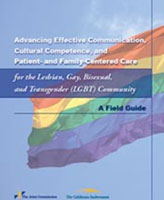Multicultural Services Group
 |
A Field Guide: Advancing Effective Communication, Cultural Competence, and Patient- and Family-Centered Care for the Lesbian, Gay, Bisexual, and Transgender (LGBT) Community
|
Cultural Proficiency Continuum (Excerpted from Cultural Proficiency: A Manual for School Leaders, by Randall B. Lindsey, Kikanza Nuri Robins, Raymond D. Terrell, published by Corwin Press.
Purpose
The purpose of the Multicultural Services Group is to address issues of quality and quantity in addictions and mental health services and staffing, and to develop a recovery oriented service delivery system which promotes education and best practice strategies that are appropriate to the lifestyles, special needs and strengths of New Jersey's diverse minority and cultural groups. The MSG will make recommendations for addictions and mental health services that are culturally sensitive, culturally competent and accessible in a language understood by the consumers and families. By partnering with addictions and mental health providers, consumers and their families in the planning, development and implementation of culturally and linguistically effective services, disparities and stigma that exist within New Jersey's mental health delivery system will be minimized. Training of staff, agencies, people in recovery and family members is essential to achieve a transformed recovery oriented system.
Goals
To utilize existing tools from SAMHSA, NASMHPD and CSAT as we integrate cultural and linguistic competence and expectations into all services and programs, including Community Wellness and Recovery Centers, contracted with the Division of Mental Health and Addiction Services (DMHAS).
To improve access to quality consumer-centered services through the provision of culturally and linguistically competent services.
To promote on-going technical assistance, training, outreach and consultation on cultural and linguistic issues which encompass concepts of Wellness and Recovery for provider agencies, self-help centers, consumers and family members.
To reduce and ultimately eliminate disparities in mental health and physical health for minority populations.